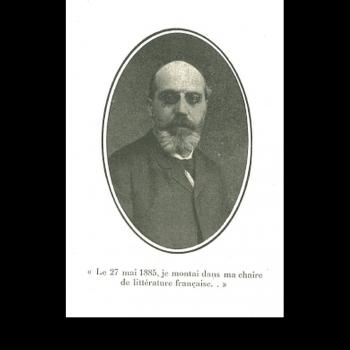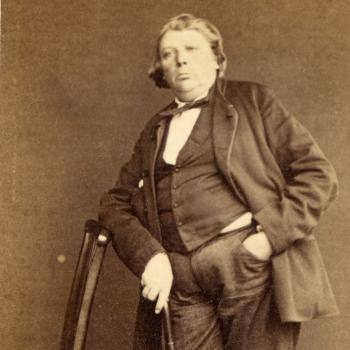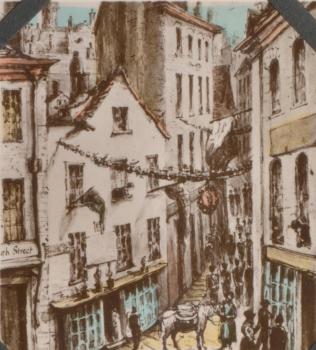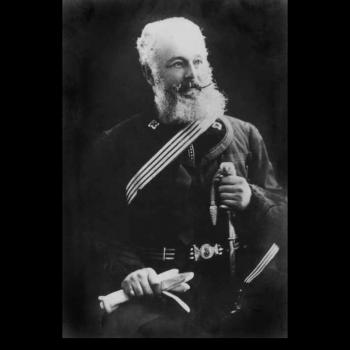5th July 2017
An interview with, and the obituary of, 'the oldest man in the island,' Thomas Mauger Gore, carpenter and builder, who helped Victor Hugo realise his vision at Hauteville House and especially at Hauteville II, Juliette Drouet's house in Guernsey. Obituary from The Star of Tuesday March 6, 1928, interview in the same newspaper, July? 1927. Part of the Victor Hugo and Guernsey project. [By Dinah Bott]
28th June 2017
From an American publication which lasted all of five years: The Continent, published by Albion Tourgee, Vol 4, 1883, p. 135. An extract from an article, 'The Normandy of the Sea.'
16th June 2017
The Parisian Paul Stapfer was born in 1840 and graduated in Classics in 1860. In 1866 he joined the staff at Elizabeth College, Guernsey, to teach French. He calculated that this employment would give him time to work on his doctorate in English literature, and that he could thus both improve his English and observe the doings of Victor Hugo. He was the author of a significant book of memoirs of Victor Hugo, Victor Hugo à Guernesey: souvenirs personnels. This is part of the Victor Hugo and Guernsey project. [By Dinah Bott]
16th June 2017
When the French government declared an amnesty in August 1859, the majority of political exiles returned to France. Victor Hugo announced that he would return to his homeland only when liberty returned there; he would not accept the amnesty. His friend Kesler pursued the same policy and remained in Guernsey until his death in 1870. This is part of the Victor Hugo and Guernsey project. [By G Stevens Cox and D Bott]
13th June 2017
Minutes of evidence taken before the Commissioners for inquiring in to the state of the criminal law in the Channel Islands. Second Report of the Commissioners &c, London: Clowes, 1848, p. 142. The statements were made by John de Havilland Utermarck, Contrôle de la Reine, on Spetember 28, 1846.
13th June 2017
By architect and wit Amias C Andros, published in the Star in 1879. See the two bound volumes of his press cuttings in the Library for further information. The illustration is A view from Marshall's Hotel, 1832, by Celia Markham (in the Priaulx Library collection.)
9th June 2017
Victor Hugo had a couple of favoured coachmen whom he used to drive him on his excursions around the island. Hugo had a few strictly prescribed routes, and would become almost anxious if pressed to deviate from them. This would sometimes prove tedious for his familial entourage, who would often accompany him; but Mme Drouet was always happy to indulge him. This is part of the Victor Hugo and Guernsey project. [By Dinah Bott]
6th June 2017
In an interesting article in this week’s Academy, says the Pall Mall Gazette of the 21st inst. (1876), M Jules Andrieu discloses certain curious discoveries made by him as to Victor Hugo’s method of procedure in composing his last romance. From this it would appear that even a great genius, and one also who has of late affected encyclopaedic learning, may be reduced to the necessity of ‘cramming’ for the purposes of a particular work; and that, like others who cram, he is not over-fastidious either as to the field of his investigations or to the accuracy of their results. [By Dinah Bott]
6th June 2017
Marc Anthony Bazille Corbin of La Porte was Hugo’s doctor for several years, following the departure from the island of Dr Emile Allix. This is part of the Victor Hugo and Guernsey project. [By G Stevens Cox and D Bott]
6th June 2017
A defence of Victor Hugo and of free speech from the Daily News (founded as a radical newspaper in 1846 by Charles Dickens. Its editor in 1855 was William Weir, a socialist barrister whose increasing deafness led him to journalism.) 'The political exiles in Jersey, who signed the protest against the expulsion of the three gentlemen connected with the journal L’Homme, have in their turn been ordered to quit the island before the 2nd November. What crime have they committed? They have said in 1855 what Sir Charles Wood, the Duke of Newcastle, and Sir James Graham said in 1851, when they were cabinet ministers.'
22nd May 2017
Victor Hugo was not a Christian in the strict sense. He was a deist, profoundly religious in his way. This is part of The Victor Hugo and Guernsey project.
22nd May 2017
Throughout his life Hugo took an interest in crime and punishment, not least in Guernsey when he was writing Les Misérables. This is part of The Victor Hugo and Guernsey project.




